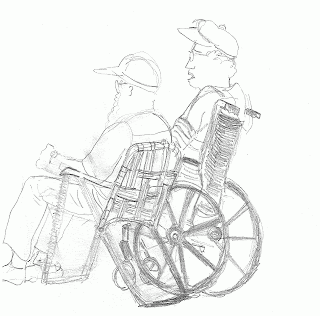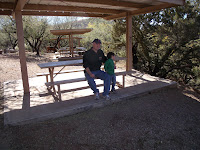This is another picture I drew on the camino, this time in Logrono, Spain. It was the middle of June, when the storks were nesting. As charmed as we may be by the idea of storks and their babies, I think the Europeans are less enthralled. The birds make a terrible chatter, and they take over the tops of public buildings, like the steeple in this picture.
I was already badly slowed down on the trail by the time I drew this. My feel were killing me, and it was obvious I was not going to keep up with the group I befriended in Pamplona at the beginning of the walk. Going slowly and being left behind is ego destroying for me. It has always been my habit to rush, to stay on top of things, and to plan every empty minute as well as speed through activities that need more thoughtfulness. As I result, I often make my life more difficult. The other day I was trying to log-in to a retirement account my school set up for its employees. I have a little book where I keep track of all these sign-ins for online accounts like Travelocity, Amazon, and banking sites. I'm often in a rush, though, and I decide I'll write the new userid and password down in just a few minutes, and it doesn't happen because I forget.
It really sucks to be left out of your own account, unable to hack in. If you can't hack into your own account, how little do you know yourself? And, of course, you only get a few chances and then you're banished from admission until you start the process all over again and re-establish an account.
In times like that, I dislike my haste. I'm a hasty pudding of a person in this regard. My parents taught me to never keep anybody waiting. Back in high school, when I would babysit, Mom had me waiting out in a snowbank for Mr. Threechildren to come and get me and take me back to his house. Sometimes I'd be out in a blizzard for 20 minutes while Mom waved from the window and shouted, "He'll be here any minute!" It's all part of being taught not to take up any space, waste anyone else's precious time.
You know how other people in the line at the grocery store carefully count their change from the clerk, line up all the bills by denomination, and then slowly get their wallet out of their purse to neatly place the money inside? I hate those people. I'm the dead opposite. When the cashier gives me change, I stuff it in my coat pocket, along with the sales slip, and sometimes the whole wad in halfway falling out of my coat as I hurry along. Never want to keep anyone waiting. It's the same when I open these online accounts; I'm in a mad rush for no reason. I've meditated for years, learned to do walking meditation with the speed of a caterpillar, but nevertheless, in daily life I seem to think I'm in a race.
Nobody writes checks anymore, but that's another example of being prepared to a ridiculous point. How people pay is a focus on "In Treatment"--some patients come in and immediately force a check on Alex, or they want to make it out right away. I'm like that--I would have every field of the check filled in beforehand and just cram it in his hand. Other people can't even find their checkbook, or don't ask about money and leave it up to Alex to send them the bill. I remember one time in therapy when I failed to have signed the check which I'd fully prepared hours ahead for time. My therapist called up and reamed me! He said I was subconsciously resentful of paying him. Well, duh...it wasn't even subconscious. That's something Alex might say as well...he turns everything into fodder for discussion.
I even sit there during "In Treatment", plotting how I can race to the bathroom and floss my teeth as the credits roll during the end of one patient's story and before the main screen of the DVD and next patient to play arrives. Don't want to miss a minute. I guess I think I'm accomplishing something.
 Oh well, I said I wouldn't blog again until I got home from Georgia, but I'm back in Chick-fil-A with my grandkids. Truett, the guy who started these chain restaurants, is a Depression era guy who has somehow managed to get franchise owners and employees to treat people as well as possible. I asked for a refill for my lemonade this morning, and the young teenager waiting on me said "my pleasure" when I thanked him. I was really taken aback. Call is southern hospitality...I guess they've taken service to a new height. But anyway, what's that got to do with Christmas, huh? We're here so that my grandson Garrett can play while my daughter Renee madly goes through all her presents for him and figures out if she's ready for tonight. Alex and I get the easy job, sitting in here while people eat their chicken sandwiches and drink sweet tea.
Oh well, I said I wouldn't blog again until I got home from Georgia, but I'm back in Chick-fil-A with my grandkids. Truett, the guy who started these chain restaurants, is a Depression era guy who has somehow managed to get franchise owners and employees to treat people as well as possible. I asked for a refill for my lemonade this morning, and the young teenager waiting on me said "my pleasure" when I thanked him. I was really taken aback. Call is southern hospitality...I guess they've taken service to a new height. But anyway, what's that got to do with Christmas, huh? We're here so that my grandson Garrett can play while my daughter Renee madly goes through all her presents for him and figures out if she's ready for tonight. Alex and I get the easy job, sitting in here while people eat their chicken sandwiches and drink sweet tea. 













